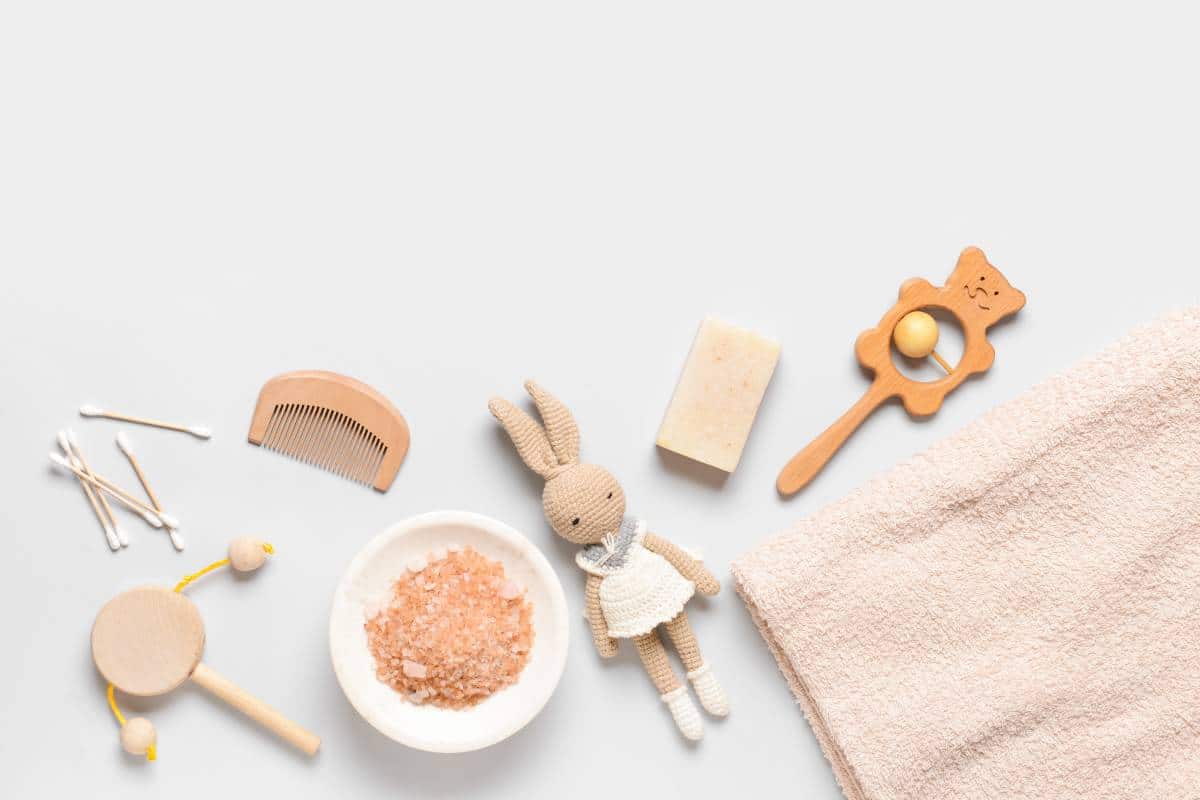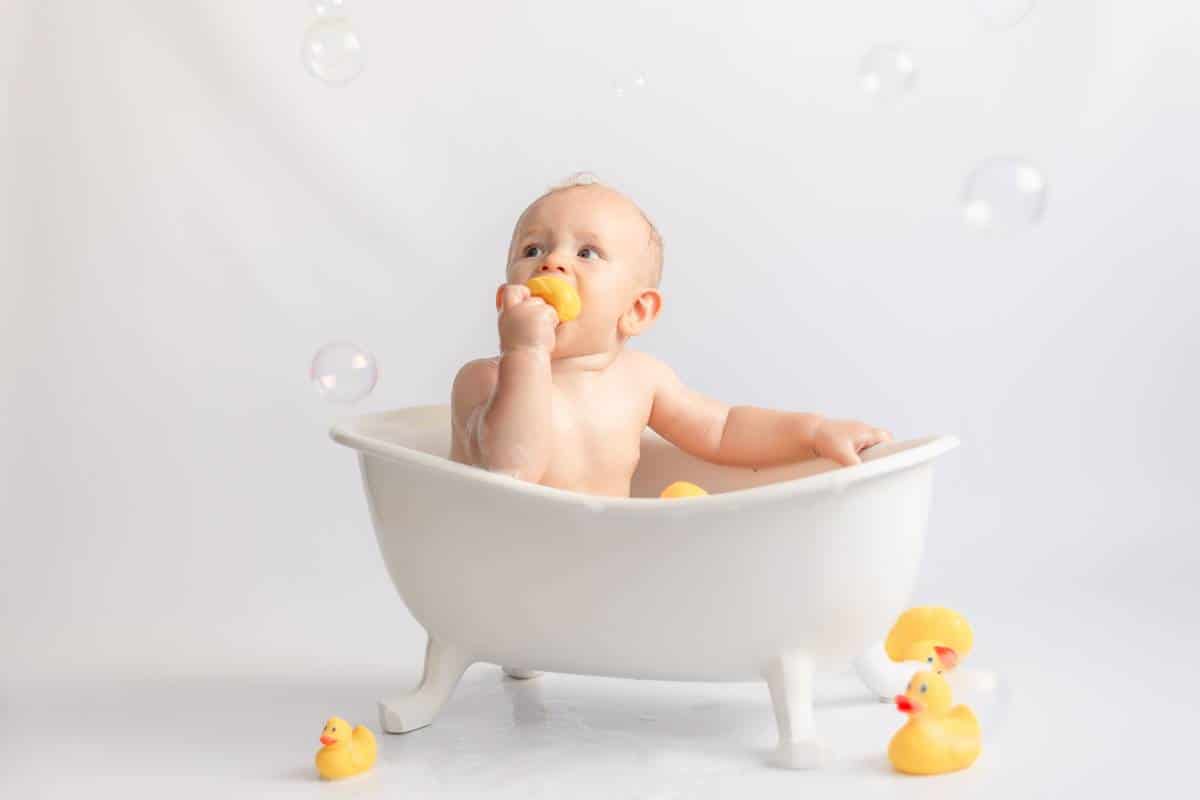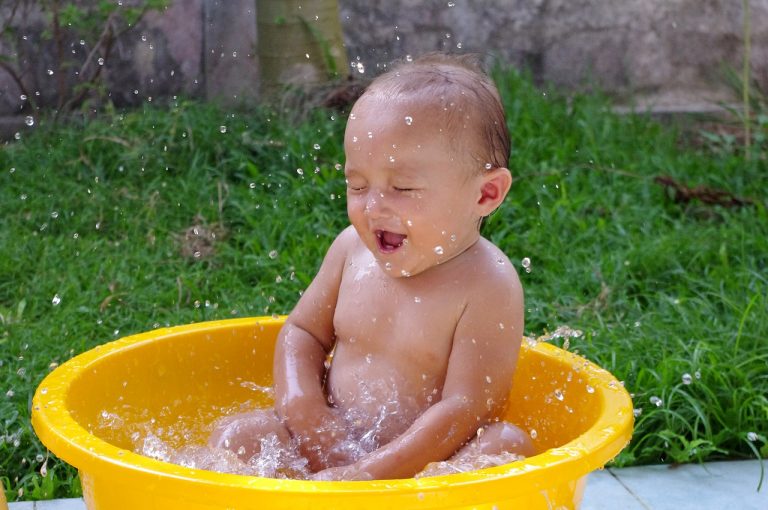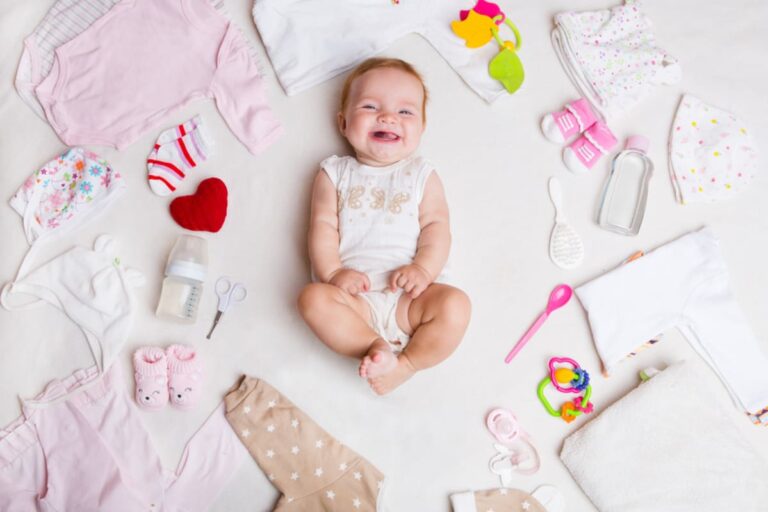There are so many important considerations to make when it comes to taking care of and keeping your baby healthy. How you look after your baby’s skin is one of those important decisions as skin is the largest organ in the human body and it’s linked closely with our overall health. Natural and organic skincare products tend to be safer, gentler and better for adults and are even more important for taking care of your baby’s naturally delicate and sensitive skin. Natural baby products will keep your baby’s skin hydrated, nourished and clean, without putting them at risk of absorbing toxins and other nasties.
In This Article
Baby skin is different
The first thing to know about taking care of your baby’s skin is that it’s different to your skin and even to older children’s skin. Baby skin has a different structure to adult skin; the cells are smaller, and the collagen fibres are thinner. According to recent clinical findings, an infant’s outer layer of skin/epidermis is 20% thinner than adults. This means a baby’s skin is more prone to dryness than adult skin. A baby’s body surface to weight ratio is also higher than that of adults which means a baby is has naturally sensitive skin and is more vulnerable to sun exposure. A baby’s skin has also been shown to have a high pH than adult skin, which is linked to its increased sensitivity. You might notice that baby skin tends to be naturally dry, this is because baby’s have a high ability to absorb water, but they also lose water at a faster rate. Overall, your baby’s skin is more prone to dryness and sensitivity, which is why it’s important to sue the best quality, natural skincare products on your little one.
Keeping your baby’s skin healthy
So, how do you keep your baby’s skin healthy and protected? There are several essential factors that should be part of any good baby skincare routine.
Bath time
Bath time is an essential part of keeping your baby’s skin clean and protected from bacterial infections and rashes. As a general rule, you should aim for two-three baths a week for your baby. Most people opt for a specific baby bath or a baby bath insertion you can use in your regular bath. No matter what bath you choose, a baby should not be left unattended and should be held and supported throughout the bathing process. The temperature of your bath water is important, due to your baby’s delicate skin. You should use warm water and fill the tub no more than few inches deep. If your baby has severe dry skin, you can use baby oil in the bath water to make it more nourishing.
To prevent your baby from getting cold, you should regularly pour cup-fulls of warm water over their shoulders and chest, where they aren’t submerged in the water. When lifting your baby out of the tub, be sure to use one hand to support their neck and head and the other to support their bottom. Dry your baby with a soft fibre, gentle towel – preferably one with a hood.
Moisturising and massage
It’s important that you apply baby lotion or oil to lock in moisture and prevent dry skin after bath time. You can also do this throughout the week, on non-bath days, to keep your baby’s skin soft and nourished. When applying baby lotion or oil, you can perform what’s known as baby massage. Baby massage has many benefits. It can help you bond with your baby, and it can help soothe and relax both parent and child. There are also lots of skin benefits to performing a baby massage with a natural baby oil. The act of massaging promotes circulation for your baby and the oil provides your baby’s skin with lots of micronutrients like vitamin A and E (depending on the plant oil) and, of course, lots of much-needed moisture to prevent dryness, chafing and rashes.
To perform a baby massage, apply a few drops of baby massage oil in your warm hands and start by massaging the bottoms of your baby’s feet. Use long, smooth strokes up baby’s legs and downward ones on their arms. For the chest, place one hand on each shoulder and use a gentle, inward stroke towards their chest. If the baby’s tummy feels soft, you can use very gentle circular motions but don’t persist if your baby gets restless and their tummy seems unsettled. It’s best to not put pressure on the space between the nipples and tummy. You can give your baby some tummy time and use gentle downward strokes on their back. The key to a successful baby massage is to use gentle, light touches and to read your baby’s signs. If they are not settled, or you are tense and stressed then it’s best to save the massage for another time. This should be a pleasant bonding experience for carer and baby.
Sun protection
The sun is one of the biggest threats to our skin and this is especially true for your little one. The Cancer Council recommends that you avoid sun exposure for your children as much as possible. Whether you are out on a sunny, hot or overcast and cold day, the Cancer Council recommends using physical barriers like clothing, wraps, hats and sunglasses. Because babies under 6 months have highly absorptive skin, it’s recommended that you avoid using sunscreen. If your baby will be exposed to the sun for an extended amount of time or there is a high UV level, you can apply some sunscreen on the areas that aren’t covered by clothing and hats. It’s always good to patch-test a product before applying it over the baby’s skin more broadly. You should also look for natural sunscreens that use physical barriers like zinc, rather than chemicals, and are formulated for sensitive baby skin.
Weather protection
Another important factor when taking care of your baby’s skin is the weather. Baby’s underdeveloped sweat glands make them prone to heat rash. Heat rash occurs when the baby’s glands get blocked and inflamed, causing small spots or blisters to develop. Heat rash is very common in newborn babies but can happen later on due to hot/humid environments and inappropriate dress. You should see your doctor if the rash doesn’t get better in 3 days. To manage the rash, soak the affected areas in lukewarm water, keep them dry and cool and don’t use harsh soaps or creams which can increase irritation.
To prevent heat rash, you should dress your baby in light cotton clothing and regularly remove and change sweaty clothing and soiled nappies. Also be sure to dry your baby’s skin folds after bath time to prevent moisture build-up. When the weather is cold, your baby’s delicate skin is more prone to dryness. You might like to use a cool mist humidifier inside your baby’s room and ensure they have lots of water to ensure they stay hydrated. Using baby oil and massage is another way to prevent skin dryness.
Common baby skin irritations
Despite all your efforts to keep your baby’s skin healthy and protected, it’s likely that they will get a rash at some point. But don’t worry, rashes are common in babies and are usually not serious and easily treatable. It’s good to be aware of some of the common rashes however and their causes os you can continue to prevent them and know what to do if you spot them forming.
Baby acne
While acne is often associated with teenage skin, it’s also common in babies too. Baby acne tends to form on the face, typically the cheeks and nose and appears as tiny red or white bumps. The cause of baby acne is unknown and it generally clears up on its own in a few months, without leaving any marks. The best thing to do if your little one has baby acne, is wash their face with a gentle soap (baby-approved) and avoid scrubbing or picking at the acne spots. You should also avoid using oils and lotions on the face as this can clog the skin. Jojoba oil, however, has been known to help treat acne.
Cradle Cap
Cradle cap, also known as crib cap, is the baby version of dandruff. In babies, this dandruff can be very thick and flaky. Cradle cap is common and mostly harmless. It tends to go away eventually on its own. However, there are some things you can do to help manage it. Brushing your baby’s hair with a gentle brush, ideally one that’s especially for baby cradle cap can help remove some clumps and flakes. Washing and hydrating your baby’s scalp with all-natural and nourishing products is also good to prevent scalp dryness. A gentle plant oil like jojoba can be massaged onto the scalp to help reduce irritation and dandruff.
Nappy/diaper rash
Nappy rash is inflammation of the skin in the nappy area. The rash looks like little red bumps or just red and inflamed skin. Usually, it’s the result of an area staying wet for too long, which is why regular nappy changes are the best solution. You can put on a barrier cream that is specifically formulated for nappy rash but avoid using talc or antiseptics. If the rash doesn’t clear within a few days, seek a doctor or pharmacist’s advice.

The importance of natural and organic products
Most conventional skincare contains chemicals and synthetic ingredients. Many formulas can be full of unknown chemicals and even other nasties like pesticides and herbicides. A truly natural product means its ingredients are derived from natural sources without any added synthetic compounds. Just be careful as companies can label their products ‘natural’ even if they still contain harsh chemicals or synthetics. A natural plant-based or vegan product is made using only nourishing plant oils and extracts. These tend to be the best for your baby’s skin. Although it’s always good to buy products that are formulated specifically for babies, as even some essential oils and extracts can be too harsh for baby skin.
Baby wash/soap
You generally don’t need to worry about using a body wash like adults use for your baby. Their skin is less prone to getting sweaty and oily. An all-natural baby wash tends to use a mix of natural plant oils with antimicrobial properties like jojoba, and coconut. Using a special baby wash can be helpful as it’s designed to be less oily and easier to use during bath time.
Baby lotion and oil
Again, it’s essential that you use an oil or lotion on your baby to lock in moisture and prevent dryness. The Jojoba Company’s Baby Oil combines nourishing jojoba oil with lavender for the ultimate skin calming experience. If you prefer to use a lotion, look for one that is hypoallergenic and formulated for ultra-sensitive skin. Some good ingredients to look for in a baby lotion include neroli, jojoba and coconut oil.
Talc free powder
You might find that you want to use some form of baby powder if your baby is prone to chafing and rashes caused by sweat. Talc isn’t recommended by many due to the fears that is cross contaminated with asbestos and can be too drying. However, there are many natural plant-based powders you can use that do the trick without stripping your baby’s skin of its natural moisture. Try and look for an all-natural baby powder that is organic and uses ingredients like tapioca, arrowroot and rice powder.
Baby wipes
Baby wipes are an essential, let’s face it. But baby wipes, like most conventional wipes, can be soaked with harsh chemicals that might kill bacteria, yes, but also dry out your baby’s skin. Baby wipes are also notoriously bad for the environment as they often wind up in landfills and contribute to waste and pollution. Luckily there are lots of natural and eco baby wipe options. Wotnot Naturals’ range of baby wipes are biodegradable, compostable and made for sensitive skin. Natural baby wipes are great to take in your baby bag to keep your little one clean and fresh throughout the day.
Healing balms and creams
Did you know there are lots of organic and natural alternatives to conventional rash creams? Yep, many plants naturally have healing properties that can speed up rash recovery and soothe irritated skin. The Physics Garden is a great brand for all-natural, remedial skincare balms. Their Baby Balm uses calendula and chamomile to provide a natural anti-bacterial and soothing solution for nappy rash, cradle crap and other non-serious irritations.
When caring for your baby’s skin, it’s important to avoid ingredients that are full of nasty chemicals and parabens – especially as baby skin is so absorptive. Choosing all-natural, plant-base and organic baby skincare products is one of the ways you can help keep your baby safe, healthy and protected.
Author Bio
Aida Rejzovic is the proud founder of Sassy Organics – an all-natural, organic and eco retailer committed to helping you adopt a more considered lifestyle. Aida is a long-time enthusiast for using natural ingredients from mother nature. You can read more of her blogs on natural and eco living here.











